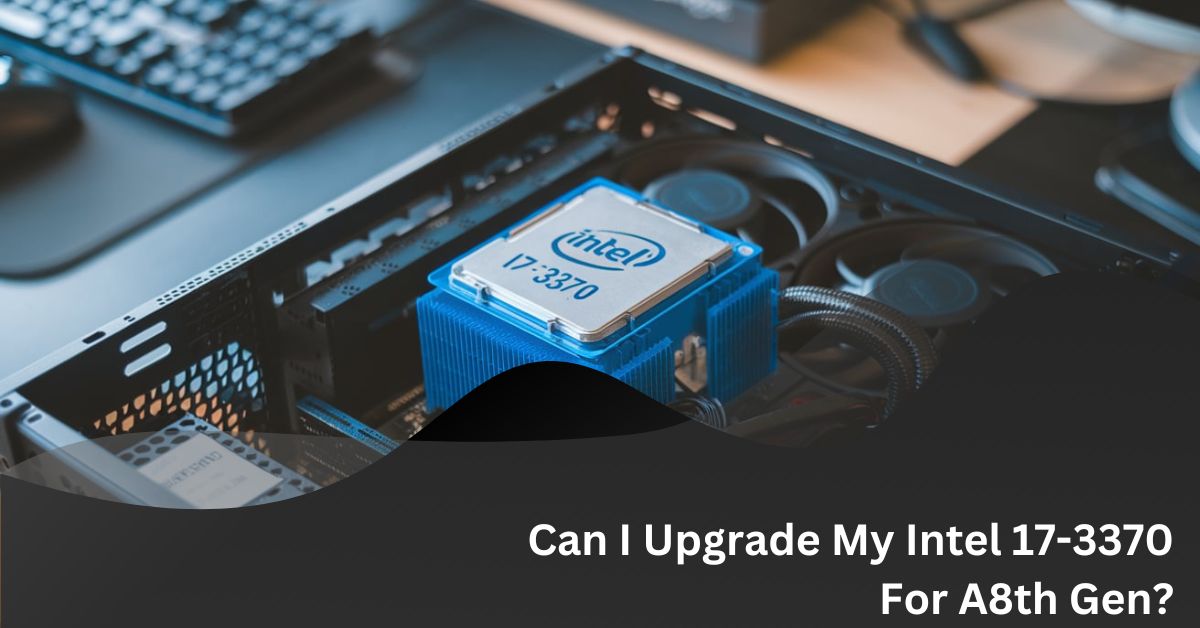Upgrading a CPU is a significant decision for many PC users, especially if you want to boost your system’s performance. If you’re asking, “can i upgrade my intel 17-3370 for a8th gen?”, you’re likely considering the benefits of newer technology and whether your existing hardware can support it.
In this comprehensive article, we will explore the nuances of upgrading from an Intel i7-3370 to an 8th generation Intel processor, addressing compatibility, performance benefits, costs, and other key factors.
Understanding the Intel i7-3370
Before diving into the upgrade possibilities, let’s take a closer look at the Intel i7-3370.
What is the Intel i7-3370?
The Intel i7-3370 is a third-generation processor, also known as “Ivy Bridge,” released in 2012. It has four cores and supports hyper-threading, which allows it to handle eight threads simultaneously. This processor was built on a 22nm manufacturing process and has a base clock speed of 3.4 GHz, which can boost up to 3.7 GHz.
Key Specifications of the i7-3370:
- Cores/Threads: 4/8
- Base Clock Speed: 3.4 GHz
- Turbo Boost Speed: 3.7 GHz
- Cache: 8 MB Intel Smart Cache
- TDP (Thermal Design Power): 77W
- Integrated Graphics: Intel HD Graphics 4000
The i7-3370 has been a reliable performer for many users, especially in tasks like gaming, video editing, and multitasking. However, as software and games have evolved, many users are finding their older processors lagging behind.
The 8th Generation Intel Processors
Overview of 8th Generation Intel Processors
The 8th generation of Intel processors, also known as “Coffee Lake,” was released in 2017. These processors were a significant step forward in terms of performance, power efficiency, and overall capabilities.
Key Features of 8th Gen Intel Processors
- Increased Core Count: Many 8th gen CPUs feature six cores, doubling the i7-3370’s core count, which allows for better multitasking and improved performance in modern applications.
- Improved Turbo Boost Technology: 8th gen processors feature Turbo Boost 2.0, which enhances clock speeds more efficiently.
- Better Integrated Graphics: With the introduction of Intel UHD Graphics 630, 8th gen processors offer better graphics performance without a dedicated GPU.
- Enhanced Power Efficiency: The newer architecture provides better performance per watt, resulting in lower power consumption.
Popular Models of 8th Gen Intel Processors
- Intel Core i5-8400: A six-core processor that offers great performance for gaming and multitasking at a competitive price point.
- Intel Core i7-8700: A six-core, twelve-thread processor that excels in both gaming and productivity tasks, making it a top choice for many users.
- Intel Core i9-9900K: A high-end option with eight cores and sixteen threads, ideal for gaming enthusiasts and content creators.
Compatibility: Can You Upgrade?
Socket Compatibility
One of the critical factors when considering an upgrade is whether your motherboard can support a new CPU. The Intel i7-3370 uses the LGA 1155 socket, while 8th generation processors require the LGA 1151 socket. This fundamental difference means that you cannot directly upgrade your i7-3370 to an 8th generation CPU on the same motherboard.
Motherboard Requirements
If you want to upgrade to an 8th gen processor, you will need a compatible motherboard. Here’s what you need to consider:
- New Socket: You will need to purchase a new motherboard that supports LGA 1151.
- Chipset Compatibility: For 8th gen CPUs, look for motherboards with the following chipsets:
- Z370
- H370
- B360
- H310
RAM Compatibility
The i7-3370 supports DDR3 RAM, while most 8th generation motherboards support DDR4 RAM. This means if you upgrade to an 8th gen CPU, you’ll also need to replace your RAM. DDR4 offers better performance and efficiency, making it a worthwhile investment.
Performance Improvement
What Performance Gains Can You Expect?
Upgrading from an i7-3370 to an 8th generation Intel processor can lead to significant performance improvements. Here’s a breakdown of the benefits:
- Increased Core and Thread Count: With six cores and twelve threads in many 8th gen CPUs, you’ll see improved performance in multi-threaded applications and gaming.
- Higher Clock Speeds: 8th gen processors have higher base and boost clock speeds, resulting in faster performance across the board.
- Better Efficiency: The improved architecture leads to better performance per watt, which means you get more power without significantly increasing energy consumption.
- Enhanced Graphics Performance: Integrated graphics in 8th gen CPUs are significantly better than those in the i7-3370, allowing for better gaming and multimedia performance without a dedicated GPU.
Real-World Benchmarks
In various benchmarking tests, users have reported noticeable differences in performance between the i7-3370 and 8th gen CPUs:
- Gaming: Upgrading to an Intel Core i7-8700 can yield frame rate improvements of 30% or more in modern games.
- Productivity: In tasks like video editing and 3D rendering, the i7-8700 can perform 40-50% faster than the i7-3370, depending on the software used.
Cost Analysis
Budgeting for an Upgrade
If you decide to upgrade to an 8th generation CPU, it’s essential to consider the costs involved:
- Processor Cost: Prices for 8th generation processors can vary widely:
- Intel Core i5-8400: $180 – $250
- Intel Core i7-8700: $300 – $400
- Intel Core i9-9900K: $450 – $600
- Motherboard Cost: A new motherboard will likely cost between $100 and $300, depending on the features you want.
- RAM Upgrade: If you need to purchase new RAM, expect to pay around $50 to $150, depending on the size and speed.
Total Upgrade Cost
Overall, budgeting for an upgrade can range from $300 to $1,000 or more, depending on the components you choose. It’s a significant investment, but for many users, the performance gains justify the expense.
FAQs
1. Can I upgrade my Intel i7-3370 to any 8th gen processor?
No, you cannot upgrade your Intel i7-3370 to any 8th gen processor without replacing the motherboard. The i7-3370 uses the LGA 1155 socket, while 8th gen processors require an LGA 1151 socket.
2. Do I need to upgrade my RAM when switching to an 8th gen CPU?
Yes, you will need to upgrade your RAM to DDR4 when switching to an 8th generation Intel processor, as they do not support DDR3 RAM.
3. What motherboard should I buy for an 8th gen processor?
Look for motherboards with chipsets like Z370, H370, B360, or H310 that are compatible with the LGA 1151 socket for 8th generation processors.
4. Is the performance difference significant between the i7-3370 and 8th gen CPUs?
Yes, upgrading from an i7-3370 to an 8th gen CPU can yield substantial performance gains, particularly in multi-threaded tasks, gaming, and overall efficiency.
5. How much will it cost to upgrade my Intel i7-3370 to an 8th gen CPU?
The total cost to upgrade can range from $300 to $1,000 or more, depending on the CPU, motherboard, and RAM you choose.
Conclusion
In summary, the question “can I upgrade my Intel i7-3370 for an 8th gen?” is a straightforward one: while you cannot upgrade directly due to socket and RAM compatibility issues, it is possible to make a complete upgrade. Replacing your CPU, motherboard, and RAM can lead to significant performance improvements that enhance your computing experience.



